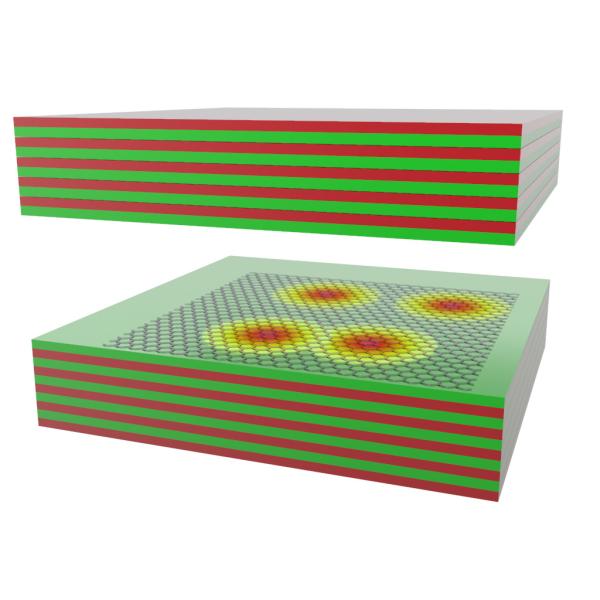
Schematic of the optical microcavity with 2D semiconductor. The nonlinear optical response arises from the larger Bohr radii Rydberg excitons allowing to push the limit to few photon nonlinear limit. Image credit: Rezlind Bushati.
The ability to turn on and off a physical process with just one photon is a fundamental building block for quantum photonic technologies. Realizing this in a chip-scale architecture is important for scalability, which amplifies a breakthrough by City College of New York researchers led by physicist Vinod Menon. They’ve demonstrated for the first time the use of "Rydberg states" in solid state materials (previously shown in cold atom gases) to enhance nonlinear optical interactions to unprecedented levels in solid state systems. This feat is a first step towards realizing chip-scale scalable single photon switches.
In solid state systems, exciton-polaritons, half-light half-matter quasiparticles, which result from the hybridization of electronic excitations (excitons) and photons, are an attractive candidate to realize nonlinearities at the quantum limit. “Here we realize these quasiparticles with Rydberg excitons (excited states of excitons) in atomically thin semiconductors (2D materials),” said Menon, chair of physics in City College’s Division of Science. “Excited states of excitons owing to their larger size, show enhanced interactions and therefore hold promise for accessing the quantum domain of single-photon nonlinearities, as demonstrated previously with Rydberg states in atomic systems.”
According to Menon, the demonstration of Rydberg exciton-polaritons in two-dimensional semiconductors and their enhanced nonlinear response presents the first step towards the generation of strong photon interactions in solid state systems, a necessary building block for quantum photonic technologies.
Jie Gu, a graduate student working under Menon’s supervision, was the first author of the study entitled: "Enhanced nonlinear interaction of polaritons via excitonic Rydberg states in monolayer WSe2,” which appears in “Nature Communications.” The team also included scientists from Stanford, Columbia, Aarhus and Montreal Polytechnic universities.
The research of Professor Menon and his co-workers could have a tremendous impact on Army goals for ultra-low energy information processing and computing for mobile Army platforms such as unmanned systems,” said Dr. Michael Gerhold, program manager at the U.S. Army Combat Capabilities Development Command, known as DEVCOM, Army Research Laboratory. “Optical switching and nonlinearities used in future computing paradigms that use photonics would benefit from this advancement. Such strong coupling effects would reduce energy consumption and possibly aid computing performance.
The research was supported by the Army Research Office, an element of DEVCOM Army Research Laboratory, through the MURI program and the NSF through the MRSEC program.
About the City College of New York
Since 1847, The City College of New York has provided a high-quality and affordable education to generations of New Yorkers in a wide variety of disciplines. CCNY embraces its position at the forefront of social change. It is ranked #1 by the Harvard-based Opportunity Insights out of 369 selective public colleges in the United States on the overall mobility index. This measure reflects both access and outcomes, representing the likelihood that a student at CCNY can move up two or more income quintiles. In addition, the Center for World University Rankings places CCNY in the top 1.8% of universities worldwide in terms of academic excellence. Labor analytics firm Emsi puts at $1.9 billion CCNY’s annual economic impact on the regional economy (5 boroughs and 5 adjacent counties) and quantifies the “for dollar” return on investment to students, taxpayers and society. At City College, more than 16,000 students pursue undergraduate and graduate degrees in eight schools and divisions, driven by significant funded research, creativity and scholarship. CCNY is as diverse, dynamic and visionary as New York City itself. View CCNY Media Kit.
Jay Mwamba
p: 212.650.7580
e:
jmwamba@ccny.cuny.edu
View CCNY Media Kit.